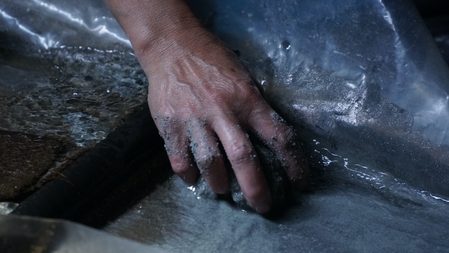SUMMARY
This is AI generated summarization, which may have errors. For context, always refer to the full article.
![[OPINION] Just transition for energy minerals is critical for the Philippines](https://www.rappler.com/tachyon/2024/02/transition-energy-minerals-february-29-2024.jpg)
The climate crisis and mining have been two of the biggest priority issues under the green agenda of the current administration. In the middle of these is the issue of energy transition minerals (ETMs), or those needed for producing cleaner energy technologies.
The Philippines hosts the fifth largest mineral reserves globally, with potentially $1 trillion in untapped reserves. These include deposits of nickel (fifth in the world), which is needed for batteries of electric vehicles, and copper (fourth) that can be applied from electric transmission in power grids to operating solar panels.
Scaling up renewable energy (RE) technologies, especially wind and solar, and reduced conversion of forests remain the most effective way of mitigating the climate crisis. While exporting ETMs to countries with the highest greenhouse gas emissions is needed to prevent further increase in global temperatures, this has to be balanced with such minerals also being used to accelerate the development of RE facilities in the Philippines.
A comprehensive critical minerals strategy, currently being developed by the government, must cover how to approach this balancing act. It should also include other key issues, such as protecting critical biodiversity and ecosystems, the well-being of local communities and indigenous peoples (IPs), and upholding corporate transparency and accountability.
The issue on transparency and accountability is especially important, considering the recent incidences involving mining companies. In recent years, nickel mining companies have been ordered to halt their operations in Sibuyan Island, Romblon and Brooke’s Point, Palawan due to their failure to secure the necessary permits and potential damages to the local environment.
The landslide in a mining village in a supposed no-build zone in Davao de Oro also raises more concerns about the safety of workers and the accountability of the mining company and other stakeholders; such details must also be considered in a critical minerals strategy.
An alternative approach
It is no secret that the mining industry is among the main proponents for the current administration pushing for the growth of the sector. This policy direction has been branded under many advocacies, from economic recovery from the COVID-19 pandemic to a response to the climate crisis.
Yet based on the history of mining incidents leaving local stakeholders and ecosystems reeling from damages and how most of the domestic mineral production goes to foreign industries, it is fair to say that there is a risk of the well-being of many Filipinos and our environment not being given enough attention in this planned expansion of the mining industry.
While the President has publicly stated that being environmentally-conscious and safe working conditions for mining workers must be accounted for by government agencies, recent incidents alone have shown that there are significant gaps in both existing policies and their implementation that need to be remedied.
Any Philippine-based critical minerals strategy must be part of a just transition, especially in the energy context, that is beyond the current notions of “sustainable mining” or “responsible mining.” It should focus not on maximizing extraction mainly to generate the most profits that has no guarantee to benefit local communities. Instead, it must be anchored on producing only ETMs that are necessary for vital economic sectors in the Philippines, such as RE technologies and other local industries.
How the production of ETMs benefits and protects local communities and IPs must also be included in this strategy. The government’s policy regarding the mining sector benefiting the Filipino nation cannot only be reflected in financial terms. For instance, no mining operations should take place in areas designated as either of critical importance for biodiversity or agricultural production, or prone to climate change impacts or other disasters caused by natural hazards.
Local stakeholders, especially IPs, must also be given the proper spaces to actively participate in decision-making processes. The exploration, development, and usage of mineral resources and products must always benefit the Filipino people first, and should be included in the development of a national industrialization plan. The State must also respect and protect the rights of these stakeholders, especially during disputes against foreign corporations.
Currently, 60% of mineral deposits in the country are within ancestral domains. If conflicts arise between businesses and IPs arise about ETMs because the latter exercises their right to not have their lands disturbed, how unfair is it for the IPs to be potentially portrayed as the ones preventing progress?
It is fair to pose this question, considering that again, players in the mining industry are the ones with the most to benefit from a growth in their sector, and the history of IPs in cases of destructive mining.
Some state officials may see these potential elements of said strategy as too restrictive. Yet these so-called restrictions are also necessary to uphold multiple components of sustainability, especially the environmental and social aspects. To minimize their importance, if not outright ignore them not only goes against the supposed policy direction, but also disregards the well-being of the very people who are supposed to be benefitting the most from it.
How a national strategy would be developed in these next few months would decide for whose benefit the production of ETMs and other minerals truly are. If anyone thinks this issue is irrelevant, they are wrong. It does matter. – Rappler.com
John Leo Algo is the National Coordinator of Aksyon Klima Pilipinas and the Deputy Executive Director for Programs and Campaigns of Living Laudato Si’ Philippines. He is also a member of the Youth Advisory Group for Environmental and Climate Justice under the UNDP in Asia and the Pacific.
Add a comment
How does this make you feel?
![[Vantage Point] Gov’t turns to mining to lift economy](https://www.rappler.com/tachyon/2022/07/TL-Govt-opens-mining-July-16-2022.jpg?fit=449%2C449)

There are no comments yet. Add your comment to start the conversation.